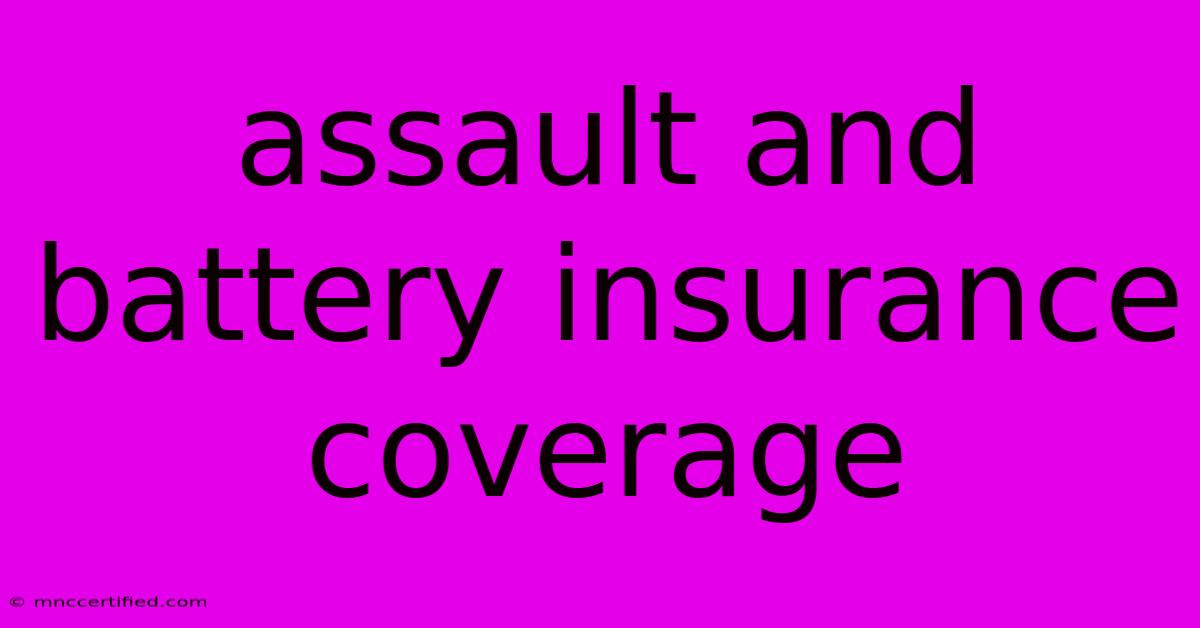Assault And Battery Insurance Coverage

Table of Contents
Assault and Battery Insurance Coverage: Understanding Your Protection
In a world where unexpected events can occur, it's crucial to be prepared for potential risks, including those involving assault and battery. This type of incident can have severe consequences, both physically and financially. Luckily, various insurance policies can provide coverage for assault and battery-related incidents, offering peace of mind and financial protection.
What is Assault and Battery Coverage?
Assault and battery coverage is a type of insurance designed to protect individuals and businesses from the financial repercussions of an assault or battery incident. This type of coverage can be found within various insurance policies, such as:
- Homeowner's Insurance: This policy typically includes liability coverage that extends to assault and battery incidents occurring on your property.
- Renter's Insurance: Similar to homeowner's insurance, renter's insurance provides liability coverage for assault and battery events occurring at your rented premises.
- Business Liability Insurance: Businesses often face the risk of assault and battery by customers or employees. Business liability insurance provides coverage for such incidents.
- Personal Liability Umbrella Insurance: This policy provides extra liability coverage beyond your existing policies, offering expanded protection for assault and battery-related claims.
What Does Assault and Battery Coverage Cover?
Assault and battery coverage typically covers various expenses related to these incidents, including:
- Medical Expenses: Coverage for medical bills incurred by the victim of assault or battery, including doctor's visits, hospital stays, and rehabilitation costs.
- Legal Defense Costs: Coverage for legal fees and expenses incurred in defending against a lawsuit arising from an assault or battery incident.
- Punitive Damages: In some cases, insurance may cover punitive damages awarded to the victim, which are intended to punish the responsible party.
- Lost Wages: Coverage for lost income if you are unable to work due to injuries sustained from assault or battery.
Key Considerations for Assault and Battery Coverage
When considering assault and battery coverage, it's essential to understand several key aspects:
- Policy Limits: Each insurance policy has specific limits on the amount of coverage provided for assault and battery incidents. It's crucial to review these limits to ensure they meet your needs.
- Exclusions: Certain situations may not be covered under your policy. For example, assault and battery arising from intentional acts or criminal activity may be excluded.
- Deductibles: You'll likely have a deductible for assault and battery claims, which is the amount you pay out of pocket before the insurance coverage kicks in.
- Premium Costs: The cost of assault and battery coverage varies depending on factors such as your risk profile, location, and the type of coverage you choose.
How to Maximize Your Coverage
- Review Existing Policies: Carefully review your existing homeowner's, renter's, or business insurance policies to understand the coverage you currently have for assault and battery incidents.
- Consider Umbrella Coverage: An umbrella policy can provide extra liability protection and expand your overall coverage for assault and battery-related events.
- Consult with an Insurance Broker: Seek professional advice from an insurance broker to determine the best coverage options for your specific needs and circumstances.
Conclusion
Assault and battery coverage is an essential aspect of comprehensive insurance protection. By understanding the types of policies that offer this coverage, the scope of coverage, and key considerations, you can ensure you have the necessary financial protection in case of an unforeseen incident. Remember, it's always best to consult with an insurance professional to tailor your coverage to your specific needs and circumstances.

Thank you for visiting our website wich cover about Assault And Battery Insurance Coverage. We hope the information provided has been useful to you. Feel free to contact us if you have any questions or need further assistance. See you next time and dont miss to bookmark.
Featured Posts
-
Judge Blocks Parole In Place Program
Nov 09, 2024
-
Wincanton Racing Two Horse Picks
Nov 09, 2024
-
Is Proton Therapy Covered By Insurance
Nov 09, 2024
-
Efl Live Latest Match Results
Nov 09, 2024
-
Barclays Investment Bank Summer Analyst
Nov 09, 2024